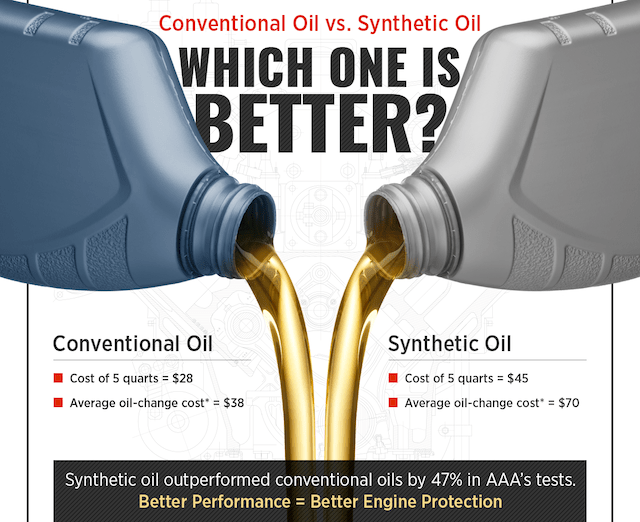Motor oil plays a critical role in keeping your car running smoothly. Its fundamental purpose is to lubricate the moving parts of the engine to prevent friction and overheating, which can cause major damage. But today’s motor oils do much more, such as keep the engine clean and protect it from wear and corrosion.
The improvement of motor oil is thanks in large part to the evolution of synthetic oil. Once used primarily in aircraft engines and high-performance vehicles, it’s now common for everyday car owners to opt for synthetic oil instead of its conventional counterpart.
But is it necessary to make the switch? What are the advantages and drawbacks? Here are the answers to all your synthetic vs. conventional oil questions.
What’s the Difference Between Synthetic and Conventional Oil?
Although they may appear the same to the naked eye, synthetic and conventional oil are significantly different when you get down to the molecular level. The latter is derived from refined crude oil. Synthetic, on the other hand, is an engineered product made from high-quality base oils. It comes in fully synthetic and synthetic blend varieties.
Both synthetic and conventional oils are mixed with additives to give them the optimal physical properties for lubricating a car’s engine.
Is Synthetic Oil Better For Your Engine Than Conventional Oil?
Yes. Conventional oil is less chemically stable, causing it to break down and lose its protective qualities faster. Because synthetic oil is made from high-quality oil (opposed to the crude oil found in conventional), it is more chemically stable, allowing it to better retain the physical properties needed to properly lubricate a car engine.
Synthetic oil’s high quality keeps your car engine cleaner and more protected. It also resists damage from high temperatures and flows better than conventional oil in cold temperatures.
Does Synthetic Oil Last Longer Than Conventional Oil?
In general, using synthetic oil will allow for longer intervals between oil changes. However, this is highly dependent on the brand of synthetic oil you use. Brand recommendations can range anywhere from 3,000 to 20,000 miles. Other factors, such as such as driving style and conditions, will also affect how often you need to change your oil.
No matter what kind of oil you use, always follow the oil change frequency recommendations in the vehicle owner’s manual.

Which is Cheaper?
Up until this point, synthetic oil seems like the clear winner. But the battle of synthetic vs. conventional oil isn’t over until you factor in the all-important price tag – and that’s when things start to shift. Synthetic oil is significantly more expensive than its conventional counterpart, sometimes up to twice as much. One AAA study found switching from a conventional oil to a synthetic oil will cost drivers on average $64 more per year, or an extra $5.33 per month.
This leads to the next question: Is synthetic oil worth the extra money? According to AAA Car Doctor John Paul, the answer is yes. “In my own cars, I have found by switching to synthetic oil I have had easier cold weather starts, quieter operation and a slight reduction in engine oil temperature,” Paul said. While conventional oil is capable of getting the job done, synthetic oil better protects your engine. This can more than make up the cost difference in the long run. The same AAA study found synthetic oil outperformed conventional oil by an average of nearly 50%.
In conclusion, switching to synthetic oil could be worth the money, especially if you tow heavy loads or operate in extreme hot or cold conditions.
Common Motor Oil Myths
If you switch to synthetic oil, you can never switch back to conventional because it will damage the car’s engine.
False: In most cases, synthetic oil uses conventional oil as a base stock, so switching back and forth will cause no harm.
Synthetic oil will cause my engine to leak oil.
False: Synthetic oil is an excellent detergent cleaner and can wash away oil sludge, which may uncover a previous leak that was being blocked by the sludge. Synthetic oil will not cause any leaks if your car is reasonably well-maintained.
All synthetic oil blends are the same.
False: There are no standards when it comes to the ratio of synthetic and conventional oil that comprises synthetic blends. The blend could contain 50% synthetic oil or 5% and there is no way of knowing.
Learn more about proper automotive care. Still have questions? Leave them in the comments below.
30 Thoughts on “Synthetic vs. Conventional Oil: Which Should You Use?”
Leave A Comment
Comments are subject to moderation and may or may not be published at the editor’s discretion. Only comments that are relevant to the article and add value to the Your AAA community will be considered. Comments may be edited for clarity and length.













What happens if the service station you have gone to for years put in synthetic oil which you did not request and have never done before and they redo the oil change. Will there be damage from any residue from the synthetic oil
Hi Denise, thanks for the question! Here’s what our Car Doctor John Paul has to say: There will be absolutely no damage to the vehicle. Synthetic oil is just oil that has been processed in a certain manner to have improved characteristics such as cold weather flow, better resistance to heat, and less wear to the engine. The remaining oil in the engine that didn’t drain will mix with the new oil. Again nothing to worry about.
I been going to the same Mechanic shop for over 30 years SO I asked the owner about the oil, I told him I was told years ago the purpose of changing the oil was because it got dirty from engine carbon not because it lost it’s Lubricity, he fully agreed & said changing regular oil every 3000 miles was better than waiting 5-10,000 with synthetic, as we were removing DIRTY OIL.
My car specifies using 0w-20 weight oil. Will I do any harm to the engine if I were to use 0w-30 weight oil? (The car is outside of its warranty period).
The 0w-30 oil would be used primarily in the summer months.
I have a 2007 town & Country, can I add synthetic oil on top of my standard motor oil when I need add oil. Or do I need to completely drain and replace the conventional oil to change to synthetic. Its just that’s its getting difficult to buy conventional oil, and synthetic is sold every where.
What about standard versus high mileage motor oil? What are the differences between the two if any, in either conventional or synthetic?
Which option is better for the environment?
Hi Hilary, thanks for the question! Here’s our Car Doctor John Paul’s answer: Oil, synthetic or conventional, when disposed of properly can be reused or re-refined into useable oil. One gallon of waste oil can be made into 2.5 quarts of engine oil that meets or exceeds new oil standards. The remaining oil is made into other lubricants. Synthetic oil in some cases is made from natural gas rather than crude oil which is a cleaner although more costly process. Some motorists using conventional oil still stick to the 3 months, 3000 mile oil change. Many people who use synthetic oil will stick with the factory recommendation, and depending on the car may be once per year. Less oil changes, less recycling is overall kinder to the environment. So bottom line, it is not the oil that is kinder to the environment but how it is used in the motorists vehicle.
I have used a good brand of non-asphalt base conventional oil for over 57 years in my automobiles and change the oil every 3000 to 5000 miles, usually closer to 3000. When I sold my first vehicle (@ 114,000 miles) and you took the valve tappet cover off, the lifters were as clean as the day the vehicle came out of the factory. Why – Early in my life I was told by a major car manufacturer’s national trouble shooter, the oil also washes down the cylinder walls which become dirty from gasoline and other chemicals mixed with it. My current vehicle has 127,000 miles on it and still running great with the original spark plugs and fuel injectors.
I have two plug-in hybrids. In these cars, the electric motor is primary and the fuel motor comes in as a booster and to provide longer range (but they are Atkinson cycle, which means torque at low RPM is often too low to keep running, so the electric motor is essential to keep the fuel motor going). Because of that, for most “around town” driving, the fuel motor does not run, and if it does run it’s only a short time. However, on a long trip, the fuel motor does all the work after the charge runs down with the electric motor providing a boost when accelerating from a start and when the car needs extra acceleration. The manufacturer recommends synthetic and that is all I have ever used in these engines. My question is: Should I make sure the oil is pure synthetic given the unusual duty cycle of these engines?
Hi Richard, thanks for the question! Here’s our Car Doctor John Paul’s answer: Synthetic oil and hybrids or plug-in hybrids were made for each other. I would just use the oil weight and grade recommended by the manufacturer. I wouldn’t be concerned about brand as long as it meets the specifications. As an example, the Prius Prime uses 0W-16 API SN/RC oil which is a fully synthetic oil and the only oil that should be used in that engine/car.
You have to use what ever the manufacture recommends or else you will void your warranty.
If you have an engine problem and you used the wrong type of oil the manufacture may not pay leaving you with an expensive repair bill.
Once the warranty period is over you can use what ever you want.
I learned about synthetics during my Air Force career as a aircraft mechanic. I’ve been using full synthetic engine lubrication since 1976. Never an engine problem with over 2,500,000 miles of driving. Synthetics also give on average a 3 to 5% mileage boost. Never had a problem. Current vehicle is a 2017 Cadillac XT 5 with 130,000 miles and on it. That vehicle is coming up on it’s 6th oil change. I follow the oil manufacturers recommended change interval of 25,000 miles but usually end up changing it around 22-23,000 miles. That’s 47 years and 2.5 million miles of driving with synthetics and never one engine repair. Definitely worth the extra cost and I have found in the long run it turns out to be cheaper.
Fairly important TO USE synthetic oil if your car has a turbo. The bearings are subjected to extreme conditions for which synthetic oils are better suited.
I have a 1994 Toyota Celica and have always used conventional oil. Should/can I change to synthetic? Can I mix the two?
Hi Judith, thanks for the question. Here’s a response from our Car Doctor John Paul: Although there are synthetic blends, it is never a great idea to mix oil, on a rare occasion there can be some compatibility issues with additives. Considering the age of your car I would stick with the Toyota recommended oil which is typically a 10W-30 SG oil.
I put synthetic in my 88 Acura Legend and my 72 Mercedes. Both leaked. The gaskets in the Acura swelled up profusely with bolt holes becoming oval and three times as long as wide. Had to replace every gasket. I switched the Mercedes back to conventional and the leaking stopped completely. So I would say it depends on the year of manufacture either the vehicle or gaskets.
I’ve found the cost difference between standard and synthetic oils to be closer to 5 or 6 dollars per 5 quart container for name brand products, all you need to do is shop around a little. At that price point, synthetic seems to be a better choice. As for dealers/garages charging $30 or $40 more for a synthetic oil change, you can just chalk that up to “Additional Dealer Profit”, there is no extra labor or parts involved in a synthetic change vs a standard one.
In the article’s graphic the price difference between conventional oil and synthetic oil is $17 ($45 – $28; I assume those are average prices). However, the difference in the average cost of an oil change is $32. I assume part of the difference in the average cost of the oil change is the cost of the oil, $17, but that would mean aside from the cost of the oil, the oil change itself costs $15 more. That price difference generally tracks what I’ve encountered when taking my vehicle in for service. Aside from the cost of the oil, I don’t understand why a synthetic oil change would cost more than a conventional oil change. Isn’t the process of changing the oil the same whether it is conventional oil or synthetic?
Was told that older cars (15 years +) do better with conventional oil. T or F?
Hi Bruce, thanks for the question. Here’s a response from our Car Doctor John Paul: It really depends on the car and how it was taken care of. As an example, one of our family cars is a 2009 VW and it has only had synthetic oil. The problem sometimes is synthetic oil is a great cleaner of sludge and if the car wasn’t well maintained, the synthetic oil can wash away the sludge and find weak gasket and possible leaks. Synthetic oil for the most part is still made with conventional oil as a base stock. What I would consider in an older car is a high mileage oil, these oils have additives than renew seals and gaskets and help prevent leaks.
I realize the mileage between oil changes can be longer with full synthetic oil but I have a car that we only put 5K miles on per year. Would the synthetic oil still need to be changed if you haven’t reached the recommended 20K miles in a full year?
You should still change your oil at least once a year. While full synthetics are more stable, the additives will break down over time and become contaminated even with minimal use. Continue to use synthetics as it offers the best protection even if you don’t put many miles on the vehicle per year.
I have a 2004 astro van with 204,000 miles . I always maintain and change the oil at about 5000 miles with the cheapest
of any band of 5/30 conventional oil. The engine has all its original internal parts. I have NO leaks. My question is why change something when it’s not broke? Why take the chance of a gasket leak? Is the mileage going to be that much better? My opinion is I’ll keep using conventional oil until it’s no longer available.
Hi Gary, thanks for the question! Here’s a response from our Car Doctor John Paul: Can’t argue with what is working for you. In fact, I felt the same way until someone sent me some synthetic oil and I put it in my wife’s old Toyota. As the temperatures drop below freezing, I asked her if she noticed anything different about her car. She said it started quicker and sounded quieter. Typically synthetic oil will lubricate quicker, performs in cold weather better and lowers engine temperature (slightly). With you van year and mileage I would probably stick with conventional oil as well.
I used to work for a major car company as a mechanic the value of synthetic oil was pointed out to me over 40 years ago I have never gone back to a conventional oil the benefits definitely weigh outweigh the extra cost, I use the top brand which was shown by Mercedes after a million miles only 3% where on a motor that’s what made me a true believer and right now synthetic oil only cost about $10 more than a conventional oil change 20 if you don’t do it yourself My engines are cleaner emissions are lower overall synthetic oil is a plus
At the end of your article you mention, almost in passing, that synthetic oils can contain anywhere from 5% to 50% synthetic and I assume the balance is conventional oil. In other words, an oil change for which you pay a substantially higher price for synthetic oil may be 95% conventional oil. That makes no sense. Can you name the brands that are 50% (Is that the max?) and everyone should know that when the dealer or other oil changer asks if you want synthetic you should ask what % of the blend is synthetic.
Mr. Greenberg, I think you may have misread the article about synthetic oil containing 5 to 50% synthetic oil. The statement was referring to synthetic BLEND motor oil. I hope this clarifies the subject.
synthetic blend vs synthetic – the blend has conventional in it
So how is one to know which is the right blend to buy ? I drive a 2014 Lexus Gx 460